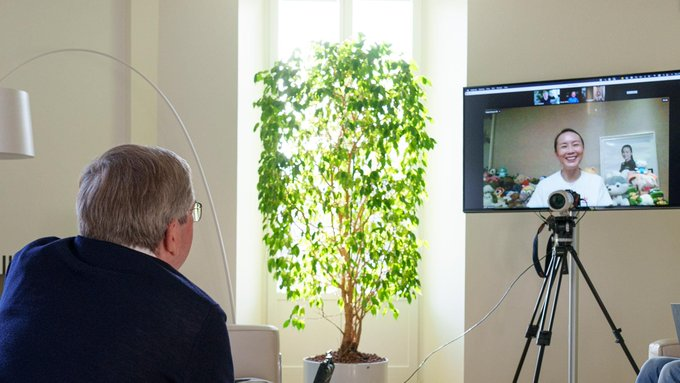International Olympic Committee (IOC) President Thomas Bach has held a video call with Peng Shuai, where the tennis player reportedly explained she is "safe and well" but asked for her privacy to be respected.
Serious concerns have been raised over Peng's well-being in recent weeks, having not been seen since November 2.
The three-time Olympian had made allegations against Zhang Gaoli, a former senior vice-premier and high-ranking member of the Chinese Communist Party (CCP), on Chinese social media platform Weibo.
Peng claimed Zhang sexually abused her 10 years ago and admitted to an on-off extra-marital affair since the coercive incident.
The post was taken down within 20 minutes and was not reported in Chinese media, subject to blanket censorship.
The IOC appears to have been reassured over Peng’s safety, with Bach joined by IOC Athletes' Commission Emma Terho and Li Lingwei, former badminton player and a Chinese IOC member, on the call.
An IOC statement said a 30-minute call has taken place, where Peng reportedly thanked the IOC for its concern about her well-being.
"She explained that she is safe and well, living at her home in Beijing, but would like to have her privacy respected at this time," the IOC said.
"That is why she prefers to spend her time with friends and family right now.
"Nevertheless, she will continue to be involved in tennis, the sport she loves so much."
Terho, who yesterday backed the IOC’s approach of "quiet diplomacy", said she was "relieved".
"I was relieved to see that Peng Shuai was doing fine, which was our main concern," Terho said.
"She appeared to be relaxed.
"I offered her our support and to stay in touch at any time of her convenience, which she obviously appreciated."
Bach invited Peng for a dinner when he arrives in Beijing for the Winter Olympics, and she reportedly accepted the offer.
Terho and Li will reportedly attend as well.
No mention was made in the IOC statement regarding the sexual assault allegations raised by Peng.
Li, in addition to being an IOC member, is a Chinese Olympic Committee vice-president and has been a member of the National People's Congress - China's national legislature.
Chief among the concerns for Peng's well-being has been that she is being coerced into towing the CCP line and Li's presence on the video call will give it less credibility in the eyes of non-IOC observers.
The IOC's approach appears in direct contrast to the one taken by the Women's Tennis Association (WTA).
The WTA earlier expressed concerns over whether Peng is "free and able to make decisions and take actions on her own, without coercion or external interference".
A video had been posted showing Peng at a restaurant with her coach and friends in Beijing, while footage of her at the Opening Ceremony of a junior tennis tournament has also emerged.
WTA chief executive and chairman Steve Simon has labelled the footage as "insufficient".
Simon said the WTA’s relationship with China is "at a crossroads", amid threats to withdraw events from the nation.
Paris 2024 President Tony Estanguet, a former IOC Athletes' Commission vice-chair and ex-IOC member, has called for the "greatest transparency" regarding the health and safety of Peng.
The Lawn Tennis Association - Britain's tennis governing body - and the National Olympic Committees of The Netherlands, Britain and Germany have all shared concern over Peng's safety along with leading tennis players, including Serena Williams of the United States, Naomi Osaka of Japan and Novak Djokovic of Serbia.
US President Joe Biden is also "deeply concerned" with the situation, and wants China to "provide independent, verifiable proof" that Peng is well, according to White House press secretary Jen Psaki.
Critics of the regime say China's record on human rights makes it an unfit Olympic host, and the Peng case is likely to give rise to more criticism over how China handles dissent.
The IOC’s "quiet diplomacy" approach comes in the build-up to the Beijing 2022 Winter Olympic and Paralympic Games.
The Winter Olympics are scheduled to take place from February 4 to 20.
The Games have been controversial, with China’s record on human rights repeatedly criticised - particularly the treatment of Uyghur Muslims in Xinjiang, which campaigners say amounts to a genocide.

